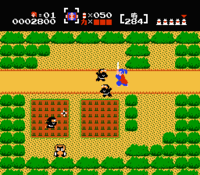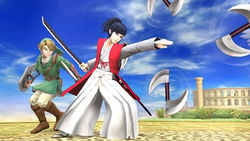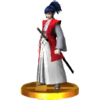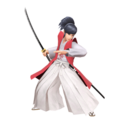| Welcome to SmashWiki! Log in or create an account and join the community, and don't forget to read this first! |
| Notices |
|---|
| The Skill parameter has been removed from Smasher infoboxes, and in its place are the new "Best historical ranking" and "Best tournament result" parameters. SmashWiki needs help adding these new parameters to Smasher infoboxes, refer to the guidelines here for what should be included in these new parameters. |
| When adding results to Smasher pages, include each tournament's entrant number in addition to the player's placement, and use the {{Trn}} template with the matching game specified. Please also fix old results on Smasher pages that do not abide to this standard. Refer to our Smasher article guidelines to see how results tables should be formatted. |
| Check out our project page for ongoing projects that SmashWiki needs help with. |
Takamaru
| Takamaru | |
|---|---|
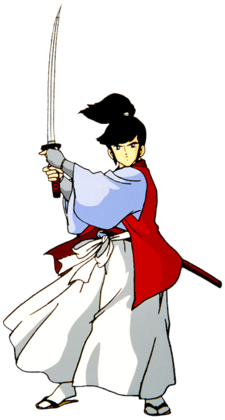  Official artwork of Takamaru from The Mysterious Murasame Castle. | |
| Universe | The Mysterious Murasame Castle |
| Debut | The Mysterious Murasame Castle (1986) |
| Smash Bros. appearances | SSB4 Ultimate |
| Most recent non-Smash appearance | Super Mario Maker 2 (2019, cameo) |
| Console/platform of origin | Famicom (Disk System) |
| Species | Human |
| Gender | Male |
| Voice actor | Tomokazu Sugita |
Takamaru (鷹丸, Takamaru) is the protagonist of The Mysterious Murasame Castle.
Origin
Takamaru is the protagonist of the 1986 Famicom game The Mysterious Murasame Castle: he is an apprentice samurai who must protect Edo Japan and four neighboring castle towns from an evil alien menace, residing in the titular Murasame Castle. Armed with only a katana and his wit, he sets off to rescue the people from the extraterrestrial's influence. The game worked similarly to The Legend of Zelda - being based on the same engine - and had several power-ups for Takamaru to use, including sandals that let him walk on water, fireballs, throwing knives, and windmill swords. Takamaru and his game became rather obscure, owing to the lack of an overseas release; prior to the Famicom disc for the game making a cameo in Pikmin 2, Takamaru was effectively unknown in the Western world. The character would later make his first international appearance in Samurai Warriors 3 for the Wii as a playable character, and after being featured in his own mini-game in the Wii U game Nintendo Land, his own game received an international release for the Nintendo 3DS in the eShop.
In Super Smash Bros. Melee
While he does not make any appearance in Melee, Sakurai stated that Takamaru was at least considered for a playable role during development, but the idea was later scrapped, likely due to low relevance.[1]
In Super Smash Bros. Brawl
Takamaru's only appearance in Brawl is as a sticker.
Sticker
| Name | Game | Effect | Character(s) |
|---|---|---|---|
| Takamaru | Nazo no Murasame Jō |
 Takamaru (Nazo no Murasamejo) |
In Super Smash Bros. 4
As an Assist Trophy
Takamaru appears as an Assist Trophy in Super Smash Bros. 4. When summoned, he moves around swiftly with dashes and jumps, mimicking the animations of his original game with choppy body movements. He attacks either by throwing Windmill Swords that travel in an "X" shape and deal 3% damage to characters on contact, or with a flurry of repeated slashes using his katana, which traps opponents and deals up to 40% damage, with high knockback on the final hit. He can be defeated if he takes enough hits.
In an interview, Masahiro Sakurai stated that he briefly considered Takamaru as a playable character for Super Smash Bros. 4, but just like how Takamaru was scrapped in Melee, he felt that Takamaru's popularity was too low to make the cut, relegating him to Assist Trophy status.
As a costume

Takamaru is also the basis of a downloadable Mii Fighter costume for Mii Swordfighters. Nintendo also released a QR code for those who wish to have the exact Mii used in the costume's advertising.
Trophy
Takamaru's trophy appears in both versions. In Super Smash Bros. for Wii U it is part of the Memorabilia Trophy Box.
- Takamaru
The main character of The Mysterious Murasame Castle. In this game, he dashes and jumps straight to the nearest opponent and shows off his swift sword skills. If he's got a bit of distance, he uses his special ninja techniques, based on the rock and the bishop in Japanese chess, to send projectiles spinning through the air.
In Super Smash Bros. Ultimate
As an Assist Trophy
Takamaru returns as an Assist Trophy, acting like how he did in Smash 4, albeit KOing him now earns a point.
Takamaru cannot appear on Boxing Ring, Mute City SNES, and Norfair.
As a costume
Takamaru's wig and outfit also return as part of the base game.
Spirit
| No. | Image | Name | Type | Class | Slots | Base |
Max |
Base |
Max |
Base |
Max |
Ability | Series |
|---|---|---|---|---|---|---|---|---|---|---|---|---|---|
| 1,128 | Takamaru | ★★★ | 2 | 2948 | 8869 | 1541 | 4636 | 1139 | 3427 | Sword Attack ↑ | The Mysterious Murasame Castle |
Gallery
Takamaru fighting along side Diddy Kong, Fox, and Falco against Bowser.
Takamaru and Palutena
Takamaru and Ganondorf
Takamaru and Nikki as a Mii Gunner.
Takamaru attacking Duck Hunt.
Names in other languages
| Language | Name |
|---|---|
| 鷹丸, Takamaru | |
| Takamaru | |
| Takamaru | |
| Takamaru | |
| Takamaru | |
| Takamaru | |
| Takamaru | |
| 타카마루, Takamaru | |
| Takamaru | |
| Такамару |
Trivia
- Even though Takamaru has an English voice actor in Darrel Guilbeau for his appearance in Samurai Warriors 3, Takamaru is only voiced in Japanese in his appearances in the Smash Bros. franchise.
- This makes him one of the six characters to have an English voice actor yet not be voiced in English in Smash, with the others being Yuri Kozukata, Mewtwo, Luminary, Cloud Strife, and Sephiroth.
- Despite being depicted as a samurai in all of his appearances before being an Assist Trophy in Super Smash Bros. 4, Takamaru is mislabeled as being a ninja in the English translations of his character Trophy. He is even shown wielding a ninjatō, a weapon associated with ninjas, rather than wielding the katana like his previous incarnations.
- In the Wii U version, the "Game Releases" section of the trophy description only mentions The Mysterious Murasame Castle's international debut on the Virtual Console in 2014, and not its original Japanese release on the Famicom in 1986.
- In Ultimate, Takamaru’s first line does not appear on Sound Test, despite the line being played out after getting summoned out of the Assist Trophy.
References
| show Assist Trophy characters |
|---|
| show Character Inspirations for Mii Fighter Costumes in Super Smash Bros. 4 |
|---|
| show Character Inspirations for Mii Fighter Costumes in Super Smash Bros. Ultimate |
|---|
